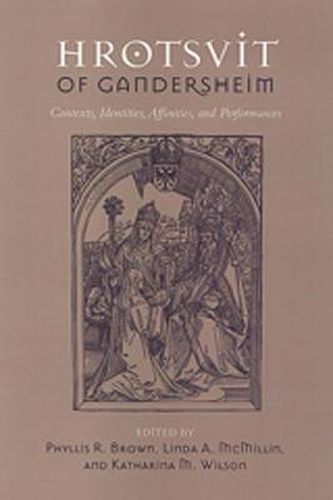Readings Newsletter
Become a Readings Member to make your shopping experience even easier.
Sign in or sign up for free!
You’re not far away from qualifying for FREE standard shipping within Australia
You’ve qualified for FREE standard shipping within Australia
The cart is loading…






Hrotsvit was the first dramatist of Christianity, the first female Saxon poet, the first Germanic author to employ the Faust theme, and one of the first Western writers to compose a Christian epic. The essays in Hrotsvit of Gandersheim examine the historical, cultural, legal, and political contexts of Hrotsvit’s works, locating her opus within the tenth-century aristocratic and clerical intellectual milieu.
This collection contextualizes Hrotsvit’s works with respect to heroic, sexual, domestic, behavioural, linguistic, theological, and hierarchical aspects of early medieval and patristic literary traditions. It also explores other literary texts that inform Hrotsvit’s works and discusses the performance history and theatricality of Hrotsvit’s plays.
Hrotsvit’s keen awareness of contemporary issues and her determination, within the parameters of monastic-aristocratic ideological constraints, to provide her readers with a rich variety of exemplary female heroes and acts of personal courage, offer twenty-first-century readers a powerful model of responsibility and agency.
$9.00 standard shipping within Australia
FREE standard shipping within Australia for orders over $100.00
Express & International shipping calculated at checkout
Hrotsvit was the first dramatist of Christianity, the first female Saxon poet, the first Germanic author to employ the Faust theme, and one of the first Western writers to compose a Christian epic. The essays in Hrotsvit of Gandersheim examine the historical, cultural, legal, and political contexts of Hrotsvit’s works, locating her opus within the tenth-century aristocratic and clerical intellectual milieu.
This collection contextualizes Hrotsvit’s works with respect to heroic, sexual, domestic, behavioural, linguistic, theological, and hierarchical aspects of early medieval and patristic literary traditions. It also explores other literary texts that inform Hrotsvit’s works and discusses the performance history and theatricality of Hrotsvit’s plays.
Hrotsvit’s keen awareness of contemporary issues and her determination, within the parameters of monastic-aristocratic ideological constraints, to provide her readers with a rich variety of exemplary female heroes and acts of personal courage, offer twenty-first-century readers a powerful model of responsibility and agency.